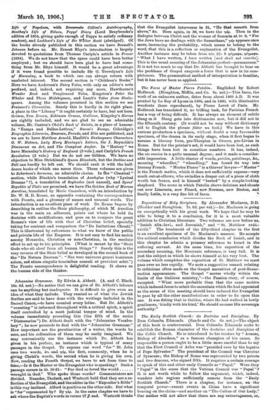The Farce of Master Pierre Patelin. Englished by Robert Holbrook.
(Houghton, Mifflin, and Co. 8e. net.)—This farce, the work of an unknown author, dates from about 1469 A.D. It was printed by Le Roy of Lyons in 1486, and in 1490, with illustrative woodcuts (here reproduced), by Pierre Levet of Paris. Mr. Holbrook has translated it, no trifling task, for Parisian French has a way of being difficult. It has always an element of eubtis slang in it Slang gets into dictionaries now, but it did not in the fifteenth century. (It would not be easy without dictionary aid to English the phrase fluter en bock.) We have in this curious production a specimen, without doubt a very favourable specimen, of the drama in its early stage, when it first began to assume a literary form, pre-Thespian in Greece, pre-Liviau in Rome. But for the printer's art, it would have been lost, as such things have been lost in countless numbers. It has, indeed, the viz comica in a quite unusual degree ; and it made a consider- able impression. A little cluster of words, patelin, patelinage, Bea., meaning "wheedler," "wheedling," has found its way into literary French. "Master Pierre" is a thieves' lawyer—" Master" is the French maitre, which it does not sufficiently express—very much out-at-elbows, who swindles a draper out of a piece of cloth worth ten francs, and is himself "bested" by a simple-looking shepherd. The scone in which Patelin shows delirium and shouts out now Limousin, now Picard, now Norman, now Breton, and finally Latin, is a very fine bit of farce.










































 Previous page
Previous page